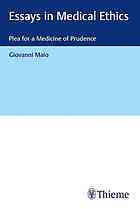
Essays in Medical Ethics Plea for a Medicine of Prudence PDF
Preview Essays in Medical Ethics Plea for a Medicine of Prudence
Essays in Medical Ethics PleaforaMedicineofPrudence GiovanniMaio,MD Physician Philosopher ChairofMedicalEthics DirectoroftheInstituteofMedicalEthicsandHistoryofMedicine UniversityofFreiburg Freiburg,Germany Thieme Stuttgart·NewYork·Delhi·RiodeJanerio Library of Congress Cataloging-in-Publication Important note: Medicine is an ever-changing Dataisavailablefromthepublisher science undergoing continual development. Re- search and clinical experience are continually expanding our knowledge, in particular our knowledgeofpropertreatmentanddrugtherapy. Insofar as this book mentions any dosage or application, readers may rest assured that the authors,editors,andpublishershavemadeevery effort to ensure that such references are in accordancewiththestateofknowledgeatthe timeofproductionofthebook. Nevertheless, this does not involve, imply, or expressanyguaranteeorresponsibilityonthepart ofthepublishersinrespecttoanydosageinstruc- tionsandformsofapplicationsstatedinthebook. Everyuserisrequestedtoexaminecarefullythe manufacturers’ leaflets accompanying each drug andtocheck,ifnecessaryinconsultationwitha physicianorspecialist,whetherthedosagesche- dulesmentionedthereinorthecontraindications statedbythemanufacturersdifferfromthestate- mentsmadeinthepresentbook.Suchexamination isparticularlyimportantwithdrugsthatareeither rarelyusedorhavebeennewlyreleasedonthe market.Every dosageschedule orevery form of applicationusedisentirelyattheuser’sownriskand ©2017byGeorgThiemeVerlagKG responsibility.Theauthorsandpublishersrequest everyusertoreporttothepublishersanydiscre- ThiemePublishersStuttgart panciesorinaccuraciesnoticed.Iferrorsinthiswork Rüdigerstrasse14,70469Stuttgart,Germany arefoundafterpublication,erratawillbepostedat +49[0]7118931421,[email protected] www.thieme.comontheproductdescriptionpage. Some of the product names, patents, and ThiemePublishersNewYork registereddesignsreferredtointhisbookarein 333SeventhAvenue,NewYork,NY10001USA factregisteredtrademarksorproprietarynames +18007823488,[email protected] eventhoughspecificreferencetothisfactisnot alwaysmadeinthetext.Therefore,theappear- ThiemePublishersDelhi anceofanamewithoutdesignationasproprietary A-12,SecondFloor,Sector-2,Noida-201301 isnottobeconstruedasarepresentationbythe UttarPradesh,India publisherthatitisinthepublicdomain. +911204556600,[email protected] ThiemePublishersRiodeJaneiro, ThiemePublicaçõesLtda. EdifícioRodolphodePaoli,25ºandar Av.NiloPeçanha,50–Sala2508 RiodeJaneiro20020-906Brasil +552131722297/+552131721896 Coverdesign:ThiemePublishingGroup This book, including all parts thereof, is legally TypesettingbyDiTechProcessSolutions,India protectedbycopyright. Any use, exploitation, or commercializationoutsidethenarrowlimitssetby PrintedinGermanybyCPIBooksGmbH54321 copyrightlegislationwithoutthepublisher’sconsent isillegalandliabletoprosecution.Thisappliesin ISBN978-3-13-241136-4 particulartophotostatreproduction,copying,mi- meographingorduplicationofanykind,translating, Alsoavailableasane-book: preparation of microfilms, and electronic data eISBN978-3-13-241145-6 processingandstorage. Contents AbouttheAuthor............................................................ vii Introduction................................................................. viii Chapter1. MeetinginthePetriDish?..................................... 1 ReproductiveMedicinebetweenExigencyandEngineered Normality................................................................. 1 TheChildasaProduct:TheLogicofEngineering.......................... 6 TheLogicofDepersonalization........................................... 15 SocialEggFreezing:FamilyPlanningonIce............................... 19 AlternativestoEngineeredReproduction................................. 26 Chapter2. Screen,Test,WeedOut?...................................... 31 TheDouble-EdgedSwordofPrenatalDiagnostics........................ 31 IstheHandicappedChildanAvoidableRisk?............................. 39 TheGrayAreabetweenDemandandTaboo:Abortion................... 52 Chapter3. Prettier,Better,Stronger?.................................... 62 WhyDoWeWanttoOptimizeEverything?............................... 62 EndangeringtheGoodLife............................................... 68 ConditionsforaGoodLife ............................................... 74 Chapter4. IsHealthaDuty?............................................... 86 PersonalResponsibilityIstheNewParadigm............................. 86 IsSicknessGuilt?......................................................... 93 HealthLiteracyIsMoreAttitudethanKnowledge ........................ 98 v Contents Chapter5. TheCrisisofConfidenceinOrganDonation............... 104 ConditionsforConfidence .............................................. 105 IsBrainDeaththeDeathofthePerson?................................. 111 AnApproachtoHumaneTransplantMedicine........................... 116 Chapter6. OntheValueofAge,BeyondtheFitnessImperative .... 124 “SoThattheArcofLifeMayBeComplete”.............................. 125 AgeIsaClearViewofReality............................................ 129 TheRelationofDependency............................................ 132 Chapter7. LivingWills-AreFormsReplacingDialogue?............. 138 TheLivingWill.......................................................... 138 AutonomyandCare..................................................... 142 FormsCannotSubstituteRelationships.................................. 145 Chapter8. BeingAbletoLetGo.ForaNewCultureofDying........ 151 “Self-DeterminedDeath”—ActiveEuthanasiaIsEthicalResignation...... 152 TheRationalizationofDeathandtheQuestionof“Meaning” ........... 158 WhatCouldGoodDyingLookLike?..................................... 166 Epilogue:HappinessLiesinOurAttitudeTowardtheWorld......... 172 MedicineofPrudence................................................... 173 WhereIstheYardstick?................................................. 177 MedicineandtheQuestionoftheGoodLife............................. 178 TheChanceofInnerHealingPower..................................... 181 Notes ......................................................................... 184 Index.......................................................................... 189 vi About the Author Giovanni Maio is the chair of medical ethics at the Albert Ludwig UniversityofFreiburg,whereheheadshisowninstitute.Heisbotha philosopher and a physician with many years of clinical experience. Maio criticizes the promises of feasibility of an engineered medicine and advocates an ethics of prudence: “We cannot become happy without an insight into the limits of what is feasible and the acceptanceoftheworldasitis.” vii Introduction “Everythingcannotbeeverything.” (IngeborgBachmann) Whowouldwanttogiveuptheopportunitiesthatmodernmedicine offers us today? We owe a lot to them, from the very beginning of our life until its end. Indeed, advances in medicine are the major reason why many of us are alive at all and have not had to die of diseaseorinanaccident.Medicinehelpsustoliveourlivesinamore unburdenedmanner.Itsavesuswhenwecontractadiseasethatonly ahundredyearsagowouldhavebeenadeathsentence.Tothisextent, it is great achievement that modern, well-functioning medicine is available to us. And yet it is precisely this great and indisputable success thatbears the seeds of skewed development ofother aspects ofmodernmedicine. What do I mean by this? By skewed development, I mean the observationthatmedicine,giddywithitssuccess,secretlypromisesto have everything under control. It increasingly suggests that today, in the age of highlyeffective modern medicine, one no longer needs to putupwithanything.Cuttingedgetechnologieshavemadeitpossible tovanquish diseases, extend life, make the body more beautiful, and permanently cure those suffering from hitherto incurable diseases. Butdoesthismeanitcanreallydoeverything?Inthecan-doeuphoria trumpetedbymanyareas ofmedicine,weareincreasinglyforgetting one thing. Despite all technology, one aspect of being human is that we lack the ability to determine everything ourselves and that the essential things are not in our hands. A consequence of this “forgetting” is that we are increasingly failing to learn how to cope viii
